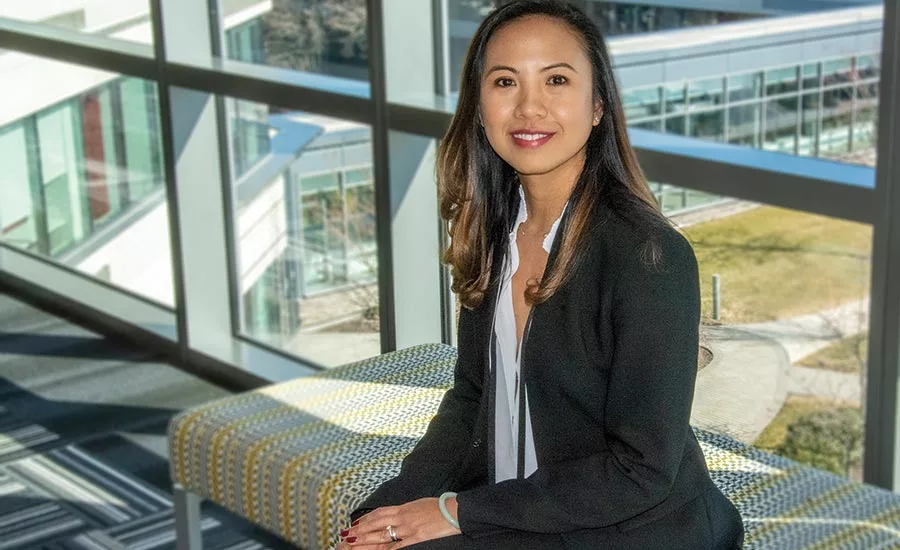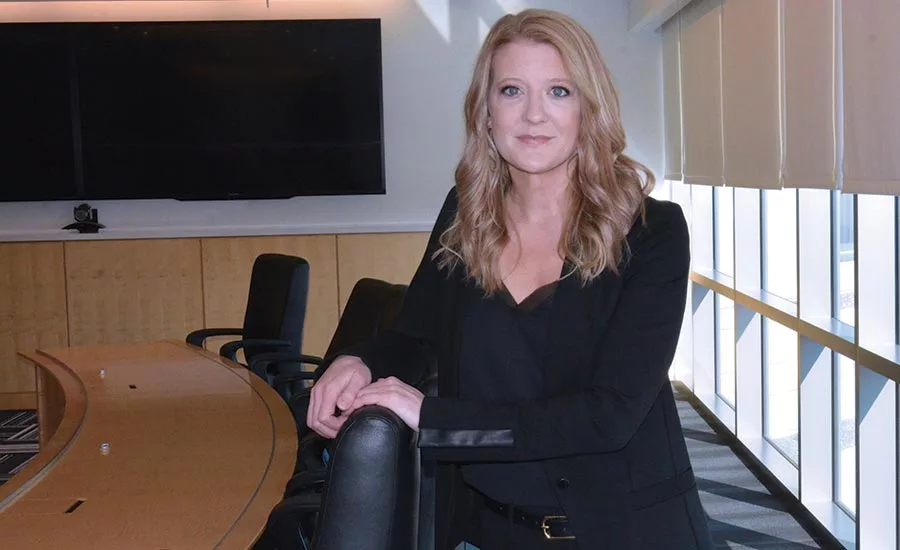The Global Security Team at Boston Scientific: Individually Strong, Collectively Powerful
A best-in-class enterprise security team at Boston Scientific.


“My job is easier because of Jack’s support and stakeholder engagement,” says Lauren De Jesus, Global Security Manager. “I can focus on my role, instead of spending time convincing leadership that working with us is necessary.”
Photo courtesy of Boston Scientific

“Growing up, my parents wanted me to become a doctor, engineer or lawyer,” says Erina Mohamad Ramly, Global Security Manager. “That’s not even close to where I ended up, but I’m glad that I’m here.”
Photo courtesy of Boston Scientific

“My work involves working with business travelers to make sure they understand the risks and threats,” says Kirstin Click, Senior Global Security Analyst. “All of our international travelers receive an automated pre-travel briefing, and we have a great travel security program.”
Photo courtesy of Boston Scientific

“I knew in college that I wanted to be in the security and intelligence community,” says Beth Theriot, Global Security Leader.
Photo courtesy of Boston Scientific

Courtney McIlveen joined the team in February as a Security Specialist. She has a background in loss prevention and field, undercover and background investigations. McIlveen has a degree in Psychology from Providence College and a Master of Arts in Strategic Intelligence and Analysis from Northeastern University.
Photo courtesy of Boston Scientific
Last month, research from Infogroup found that women hold 300-percent more leadership jobs than they did 10 years ago. The study examined historical records from 2010 to 2020 of women who held leadership roles from entry-level management to top executives.
In 2010, Infogroup had 724,296 records of women with job titles including CEO, president, director, manager and dozens of others. That climbed from nearly 2.2 million leadership jobs to an all-time-high of 2,907,708 in 2020.
John (Jack) Sullivan, chief security officer and resiliency officer for Boston Scientific, applauds that growth. For the first time in Sullivan’s career, female executives account for half of his enterprise security team, which is something that he set out to do after taking the CSO role three years ago. “I am working with a team that more accurately reflects the population that we serve. We benefit from diversity of thought, perspectives and skillsets and because of this, we are better problem-solvers and a stronger team,” says Sullivan. His team includes:
- Kirstin Click, Senior Global Security Analyst
- Lauren De Jesus, Global Security Manager
- Courtney McIllveen, Security Specialist
- Erina Mohamad Ramly, Security Manager
- Beth Theriot, Global Security Leader
Sullivan, who came to Boston Scientific after CSO roles at Starbucks and Dunkin’ Brands, personally recruited each team member. “Three years ago, I set strategic goals and knew that broader representation was important. Having the support of our executive committee and the autonomy to drive my goals forward has been a huge help in bringing us to where we are today.”
Having the ability to recruit each individual has allowed him to have a high-degree of trust early on, he says. “My approach to leadership is very collaborative, and I believe that solutions are always improved with debate and discussion from the team. It’s important that I create a team culture where everyone feels comfortable speaking up and sharing ideas. I’m upfront with my own areas of expertise, or limitations, and I’ve learned that sometimes my role is to ask the right questions rather than try to supply all the answers.”
He says that while each individual has personal and professional qualities that contribute to the team, “It’s less about an individual’s skills or area of expertise, and more about how each person’s strengths complement the rest of the team. Even as our team grows, I am still very involved with recruiting to ensure we are not only getting the best talent in the field, but also to ensure that every hire is a good fit for the team. For example, Beth and Lauren both served as Army officers and are extremely strong leaders, but they also complement each other and work together well, making them extremely effective in our line of work.”
From day one, Sullivan has stressed the value of cross-functional relationships. “I encourage the team to see past their ‘lane’ and apply their experiences, ideas and perspective, so we can leverage our collective expertise to overcome challenges,” he says. “Again, it’s less about individual roles and more about the power of the team. The issues we deal with are multifaceted and come with extremely high stakes, and we need to demonstrate collective leadership to better care for our employees and the patients we serve.”
The team has exceeded those expectations, he says, including coordinating the crisis response for Hurricane Maria, the California wildfires and most recently, the Coronavirus response. “I know the diversity on the team has improved our crisis response,” he says. “In turn, the team is earning more visibility within the larger organization and engagement with leadership is higher than ever.”
Yet, Sullivan stresses that there is no continuum for success. “Our work is guided by our caring value, and success for us means ensuring the continued safety of our employees, customers and patients,” he notes. “It’s an ongoing process that should always be improving. That doesn’t mean we overlook achievements. In the past three years we’ve received numerous awards, and we take time to celebrate those moments. At the same time, any award or team ‘win’ reinforces why we need to stay focused and continue getting stronger.”
Sullivan says he is only as strong as his team. “A win for any of us, is a win for the entire function,” he shares. “A more specific example: I have found that interacting with our key stakeholders, such as human resources, information technology and legal, became easier as we became more inclusive. Our team-oriented mentality has made it easier to develop and sustain relationships across the business.”
Here are the stories of how female security leaders are creating a best-in-class enterprise security team at Boston Scientific, with the backing and support of their CSO.
Lauren De Jesus, Global Security Manager
For Lauren De Jesus, the path to a global security role was not direct. After college, De Jesus joined the U.S. Army, and was commissioned into the Army Engineers as a Second Lieutenant, with project management responsibilities.
After six and a half years, she left the Army and secured a role at Boston Scientific as Project Manager within the Endoscopy business unit. There, she led project teams of 10-15 employees in the development of medical devices. She met Sullivan during a meeting of an employee resource group for veterans, and he recruited her to be on his team.
In her role, De Jesus is responsible for implementation and execution of the security technology that is deployed at all Boston Scientific global facilities, in addition to security vendor management. One project that she has implemented is a “playbook” that includes standards of how security technology should be designed and implemented at each site so as to create cohesion.
Another project that De Jesus is proud of is tying security technologies to the HR team, in order to mitigate threats more effectively. “Our HR databases are consistently maintained, so it’s important that enterprise security is in sync with it,” she says. “We integrated our access control and ID badging system with the HR databases in order to automate identity management,” she says. “For example, if an employee is terminated, their ID badge is automatically disabled. That was a key project to implement.”
Working with HR and other departments on the project, De Jesus says, was easier with Sullivan’s support and his established relationships with those teams. “Now, I can continue to foster those relationships, so that we can all work as a team to execute additional projects,” she says. “My job is easier because of Jack’s support and stakeholder engagement. I can focus on my role, instead of spending time convincing leadership that working with us is necessary.”
Erina Mohamad Ramly, Global Security Manager
“Growing up, my parents wanted me to become a doctor, engineer or lawyer,” says Erina Mohamad Ramly. “That’s not even close to where I ended up, but I’m glad that I’m here.”
After graduating with a Bachelor of Law degree, Ramly had ambitions to work for a big accounting firm. “At age 22, I planned to combine my law degree and my audit background and move into consulting,” she says. “But fast forward a couple of years, I saw a job posting by a semi-government regulatory agency in Malaysia. They were looking for investigators, with preferences given to candidates with legal or/and accounting backgrounds. I applied for the job out of curiosity. But once I got the role I found that I really enjoyed the work. I liked putting together the pieces to understand what happened. I also enjoyed the direct impact that my efforts had in terms of accountability or making things better because gaps had been identified. I loved that job, and it was difficult to leave and move to the United States, but that’s how I met Jack. I started out as a temporary employee on his team at another company, but I kept getting opportunities to prove myself. Once Jack moved to Boston Scientific, he recruited me for his global security team.”
“Jack had a vision for a best-in-class security team,” she adds. “He wanted our stakeholders to understand that we are not corporate cops; we are real partners that can support enterprise resiliency to protect people, profitability, brand and reputation. When we conduct our investigations, we are now seen as fact finders and not a judge or jury; not a security team with an agenda.”
One of Ramly’s responsibilities is to establish and to report metrics on when investigations close and how they were solved in a thorough manner. “Being able to communicate a high rate of case closures has elevated our status in the company. But it wasn’t hard to move the needle – it wasn’t that we were dealing with people who already had a bad impression and refused to participate or collaborate. I think that’s a real testament to the culture here.”
Kirstin Click, Senior Global Security Analyst
Kirstin Click has worked in security intelligence her entire career. Click received a degree in criminal justice and earned her Master of Science degree in Law Enforcement Intelligence Analysis while working as an Intelligence Analyst for the city of Boston. Click eventually took a position at Massachusetts General Hospital, before joining Boston Scientific in 2015 as Senior Global Security Analyst.
One of her responsibilities involves managing the travel security program, ensuring the safety of employees during unexpected events.
“It involves balancing the business need with business travel,” she says. “Some employees’ roles involve travel to higher-risk locations, and we need to be partners in helping the business to deliver healthcare products to underserved locations. My work involves working with business travelers to make sure they understand the risks and threats. All of our international travelers receive an automated pre-travel briefing, and we have a great travel security vendor. We also have a 24/7 GSOC for travel emergencies.”
Click recalls how she and her team helped an employee who was stranded during Hurricane Irma. She was traveling for personal reasons, but they were able to locate someone in the area with access to a boat to rescue her. “Even more, we were able to coordinate the rescue of 26 other people. It’s all about taking a customer service approach and following our Boston Scientific caring value.”
Click attributes much of her success at Boston Scientific to her teammates and supportive leadership, which includes Sullivan. “Due to our success in handling past disasters, such as Hurricane Irma and the California wildfires, we’ve gained visibility within the company. We’re a small team, but we are growing,” she says. “Jack is a great leader. Our entire team’s profile has grown tremendously since he came in. He’s developing our team and investing in all of us.”
Beth Theriot, Global Security Leader
“I knew in college that I wanted to be in the security and intelligence community,” says Beth Theriot.
After college, Theriot joined the U.S. Army, working in Military Intelligence. After her military career, she worked at Target Corporation in investigations and threat assessment, in addition to a role in HR, where she conducted enterprise-wide employee screenings. She joined Boston Scientific in 2017.
In her role as Global Security Leader, Theriot manages regional security teams to assess current threats and vulnerabilities and to identify protection goals, objectives and metrics consistent with corporate strategic objectives. She also manages the company’s security officer force.
“With a guard force, it’s easy to get caught up in potential savings, but I’m ensuring that we have the proper talent to accomplish our goals. One way is to make guards feel valued and a part of our team. We share very clear expectations of the skills that we need from our security guards. It’s worth our investment to create a solid onboarding and training process that’s specific to our needs, so we’ve built a comprehensive program that weaves in guard standards, site-specific requirements and customer service. Continuous training ensures that we have a program that saves lives.”
One project Theriot is proud of is her role in a program that involved stakeholders from Boston Scientific safety, facilities, operations and more to build a structure for responding to facility emergencies. “We identified risks and hazards that all business units face in each facility and developed meaningful plans that help us to respond and to be more proactive,” she says. “We developed an emergency response structure with clear roles and responsibilities to ensure that every team member knows what to do and how to hand-off during an emergency. All of our sites will continue to test, learn and evolve the program, but having a strong structure has been a huge success for us.”
The plan has been tested twice during two onsite emergencies, she says. “It worked because we practiced the plan multiple times, with tabletop exercises. Of course, there were many learnings, but it was amazing to watch leaders across the company step into their roles and know what to do.”
“There’s no way a security team can do something like that alone,” she adds. “I can’t stress enough how important it is to have cross-functional teams. We even partnered with community first responders and asked them to review plans and give feedback on how we can best support them as they arrive onsite.”
Theriot enjoys her work. “Throughout my career there have been pivotal leaders that have helped guide, mentor and support my career and enable my success. Here, I have found leaders who create an environment of collaboration and success and connect us all to our primary purpose – the patients that we serve. We are a very strong and diverse team, and every person plays a role in our success. The greatest leaders that I’ve been privileged to work for facilitate growth and encourage me to go after challenging opportunities and to develop myself. They lead by example. That’s one of the reasons that our team is so strong and that we come to work every day excited to be here.”
Looking for a reprint of this article?
From high-res PDFs to custom plaques, order your copy today!







